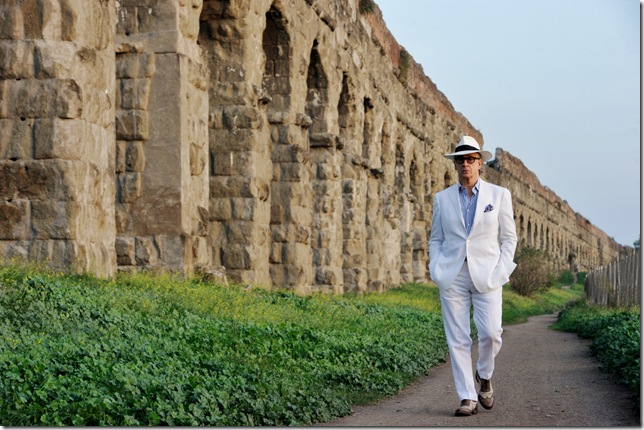The first 15 minutes or so of Paolo Sorrentino’s The Great Beauty is one of year’s most daring expressions of cinema’s intoxicating possibilities.
The opening shot starts inside a cannon, with the camera tracking out of it and up and away, like a cannonball, and we get through an entire reel before it settles down. Restless but elegant, it drifts in and around Rome’s ancient architecture, wandering acrobatically around religious sculptures, capturing choruses of nuns and star-stuck tourists. One camera-wielding foreigner faints at the sight of the jaw-dropping vistas. We imbibe it all with wide-angle lenses, Sorrentino taking care to make sure we see everything.
Then, all of a sudden, with a piercing scream directly into the camera, we’re plunged into a pulsating, exaggerated bacchanal on somebody’s estate, with liquor and techno and glittering dresses and salacious gazes. It’s like Sorrentino’s vision of Jay Gatsby’s nightlife, or perhaps one of Berlusconi’s Bunga Bunga parties.
Turns out the soirée is celebrating the 65th birthday of Jep Gambardella (Toni Servillo), a one-hit novelist from 40 years ago who now writes for a magazine and remains a fixture among Rome’s fading elite, joining the ranks of has-been television showgirls and vapid celebutantes and people who say things like “I feel Pirandello-esque lately.” Jep is comfortable in both of these worlds – let’s call them the sacred and the profane – and he becomes our protagonist and conduit to the contemporary Roman zeitgeist, which, according to just about everybody, is in precipitous decline.
The Great Beauty is a big movie, in the tradition of big Italian cinema. It is never better than in its tumbling overture, but it runs two hours and 20 minutes nonetheless, and cinephiles can hear echoes of Visconti, Tornatore and Bertolucci, all of whom, at their most indulgent, were not known for being judicious editors. More than anyone else, The Great Beauty has earned comparisons to Fellini; you can see the likeness in the film’s rendering of “la dolce vita” of today, its focus on unusual faces and bodies – Jep’s editor is a libertine dwarf – and its flirtations with fantasy and magic realism.
And like some Fellini titles, The Great Beauty is episodic in structure. There is no plot to speak of; the story is propelled by Jep’s whims and malaise, from uninspired writing assignments to strip clubs, to inevitable one-stands and sudden funerals and constant parties. Because of this, the movie can seem shapeless and unwieldy, with significant information elided. You get the feeling a lot more footage was left on the cutting-room floor.
Some of the film’s set pieces are spellbinding, though – a nude female performance artist, blinded by a veil, runs headlong into a concrete wall to make a statement about Communism; an exploited, pint-sized action painter cries out in agony while spattering a motley assortment of hues onto a canvas, to the fascinated stares of Rome’s primo gallery owners; a 103-year-saint makes a flock of migrating birds flee a patio with a simple exhale.
But what are we to do with this accumulation of unforgettable imagery? Even non-narrative experimental films need to provide us with some sort of emotional connection, and The Great Beauty lacks the heart to accompany its imaginative brain. We’re never given a reason to care about Jep’s meandering Lothario, a flaw the movie shares with some of Fellini’s late-period explorations of the hedonistic male mind. We’re left with a movie that is itself a great beauty, but it’s only skin-deep.
THE GREAT BEAUTY (LA GRANDE BELLEZZA). Director: Paolo Sorrentino; Cast: Toni Servillo, Sabrina Ferilli, Carlo Buccirosso, Pamela Villoresi, Galatea Ranzi; In Italian with English subtitles; Not rated; Distributor: Janus Films; Opens: Friday at Living Room Theaters at FAU, Miami Beach Cinematheque, The Koubek Theater in Miami and the Bill Cosford Cinema in Coral Gables
